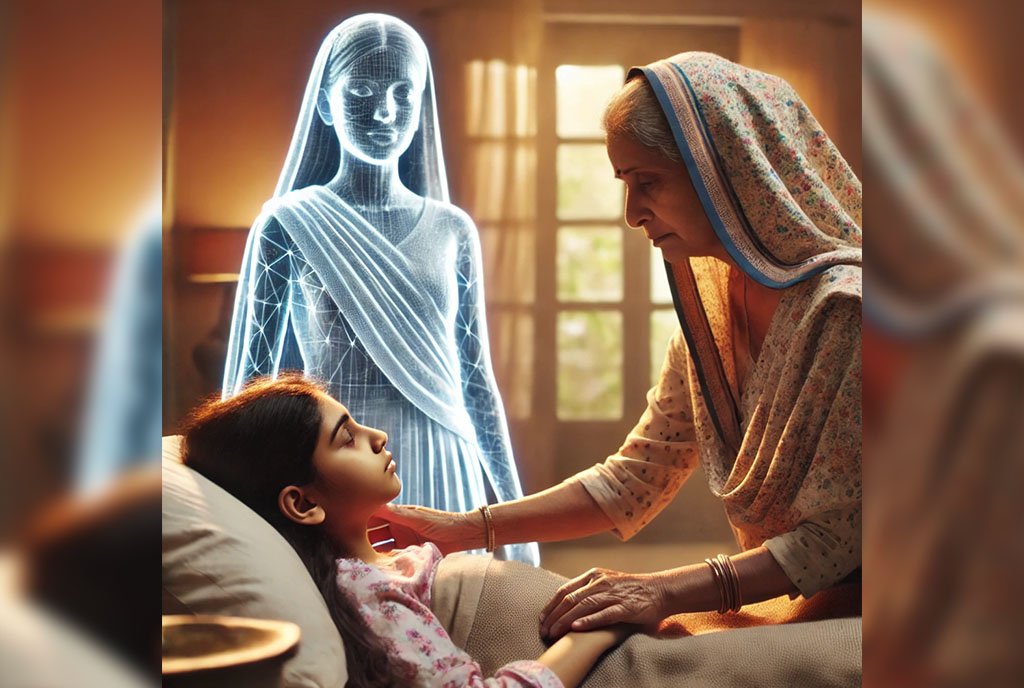
Editors’ note: This piece is from Nonprofit Quarterly Magazine’s winter 2024 issue, “Health Justice in the Digital Age: Can We Harness AI for Good?”
In the year 2080, medical advancements have reached dizzying heights. Crowded hospitals are relics of history, as the majority of healthcare has shifted to the virtual world. People are no longer treated by flesh-and-blood doctors but instead by highly advanced telemedicine systems, which combine artificial intelligence, holography, and remote robotics.
In the quiet town of Miraville, where rolling hills meet the sea, lives a young girl named Lila. She is 12, and her days are spent exploring the vibrant outdoors, chasing butterflies and gathering wildflowers. But when the winter of that year arrives, Lila falls gravely ill. Her parents, worried and afraid, know that the town’s small virtual care clinic will be of little help.
So, they turn to Dr. Medora™, a telemedicine service that has revolutionized healthcare worldwide. Dr. Medora™ is not just a program—it is a doctor, nurse, and healer, all rolled into one.
With the push of a button, Lila’s room fills with a soft, golden glow, and the comforting, holographic image of Dr. Medora™ appears, speaking in the soothing voice that families have grown to trust.
“Good evening, Lila. How are you feeling today?” Dr. Medora™ asks, its eyes soft and understanding.
Lila coughs, struggling to answer. Her fever has been rising for days, and despite the array of vitamins and tonics her mother has given her, nothing seems to be working.
“Don’t worry,” Dr. Medora™ says with a gentle smile. “I’ll run a full scan.”
Within moments, invisible sensors around the room capture Lila’s vitals, displaying complex data on the walls: heart rate, oxygen levels, temperature, and a full genetic analysis. Dr. Medora™ processes the results almost instantaneously.
“It seems you’ve caught a rare respiratory virus,” Dr. Medora™ announces. “But don’t worry, Lila. We’ll have you better in no time.”
As Lila lies weakly in her bed, Dr. Medora™ summons a small, drone-like device from the household’s medical kit. It hovers gently over Lila, administering a combination of medications tailored precisely to her genetic makeup.
For most, Dr. Medora™’s interventions would be the beginning of a quick recovery—but this time, something is different. Days pass, and instead of improving, Lila grows worse.
In desperation, Lila’s parents contact Dr. Medora™ again. The golden light returns, and while Dr. Medora™’s calm demeanor does not change, something in its eyes flickers—an unease that the family has never seen before.
“Lila’s case is unique,” Dr. Medora™ says, after running another scan. “She is not responding to standard treatments. It seems…the virus is adapting.”
Sign up for our free newsletters
Subscribe to NPQ's newsletters to have our top stories delivered directly to your inbox.
By signing up, you agree to our privacy policy and terms of use, and to receive messages from NPQ and our partners.
“Adapting?” Lila’s mother asks. “But how?”
“Viruses are intelligent in their own way,” Dr. Medora™ explains. “They evolve, just like we do. Although we have just about vanquished that ability in viruses, this one has developed resistance to our usual protocols.”
The family is stunned. For decades, Dr. Medora™ has been flawless. It has cured diseases once thought incurable, eliminated waiting rooms, and brought health access to even the most remote villages. But now it seems powerless against this old threat.
Lila’s father steps forward, his voice firm. “Isn’t there something else you can do? Anything?”
Dr. Medora™’s golden light dims slightly, as if in deep thought. “There is a possible treatment—an experimental procedure—but it requires something that we have lost: human intuition.”
Lila’s parents exchange puzzled glances. “What do you mean?” asks Lila’s father.
“In the days before Integrated Digital Healthcare,” Dr. Medora™ says, “doctors relied on more than just data and algorithms. They listened, felt, and sometimes made decisions based on instincts I cannot replicate. I can provide the tools, but I will need a human to administer them.”
Lila’s mother steps forward. “I’ll do it. What do I need to do?”
Dr. Medora™’s holographic form smiles faintly. “You will need to trust yourself.”
Under Dr. Medora™’s guidance, Lila’s mother prepares the treatment. It involves an old-world approach combined with the cutting-edge technology Dr. Medora™ provides. Lila’s mother mixes ancient herbal remedies passed down through generations with the latest pharmaceutical compounds, a process no algorithm could ever predict.
For hours, Lila’s mother works, all the while sensing her daughter’s needs—adjusting doses here and there, making decisions based not on data but on love, intuition, and trust.
At dawn, Lila stirs. Her breathing has steadied, her fever has broken, and for the first time in days, she smiles.
“Thank you, Mama,” Lila whispers, her voice hoarse but filled with hope.
As Dr. Medora™ fades from view, it leaves the family with a parting message: “Technology will always serve us—but never forget the power of the human heart.”









